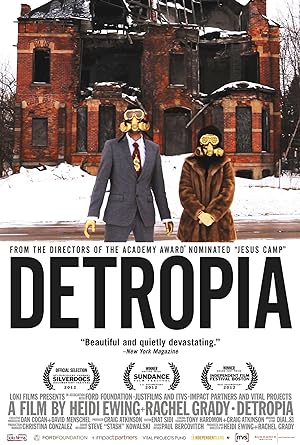Detropia is an impressionist documentary that compares and contrasts the Detroit of yesterday and today through images of the city throughout various seasons, archival footage and following various residents and officials as they reminisce of better days, worry about the future and navigate the landscape, which is a shadow of its former self. There is no narration so Detropia expects viewers to draw his or her own conclusions based on the information provided. If you are interested in Detroit or the plight of those bearing the brunt of the flight of manufacturing job from the US, then definitely check out Detropia, but if you are looking for an academic analysis, look elsewhere.
If you have seen and enjoyed the TV series Life After People in which every episode theorizes how the landscape would transform after different lengths of time without human interference, then Detropia is the real life version of the theoretical premise except there was no sexy cataclysmic disaster to cause the extinction of the human race, just the desire for bigger profit margins, and people still remain to tell you what it feels like to watch your world take a dying breath. Detropia repeatedly focuses on several individuals: a nightclub owner, a video blogger and a union president. The only people with a sense of hope and excitement are the artists who are thrilled at the affordable cost of living.
Detropia’s best scene takes place at an auto show when an on the ground expert tries to warn one of the US car promoters of foreboding foreign competition only to be dismissed. Sure the official is just a promoter, not a decision maker for the car company, but the scene is emblematic of employer employee relationships today. Most employers do not have the workers’ institutional historical memory, but are still confident that they have all the information to still make effective business decisions.
Before I watched a documentary called Burn about under-funded and over-worked Detroit firefighters. Detropia’s subjects theorize that people get a thrill from arson, but I think that several scenes from Detropia reveal the real cause. When skilled laborers are out of work, and there are scores of abandoned properties, the laborers can harvest the raw materials and are not concerned with safety precautions when welding or demolishing. The police are sympathetic and do not intervene (#crimingwhilewhite). If a spark turns into a conflagration, running instead of trying to extinguish it makes sense.
Detropia is an exercise in empathy for viewers to ask what he or she would do if suddenly your home was on the brink of oblivion. Would you stay and try to stop the decline? Would you run? Would you be paralyzed by the overwhelming scope of the problem? Would you make any sacrifice with no guarantee that survival would result?
Stay In The Know
Join my mailing list to get updates about recent reviews, upcoming speaking engagements, and film news.





